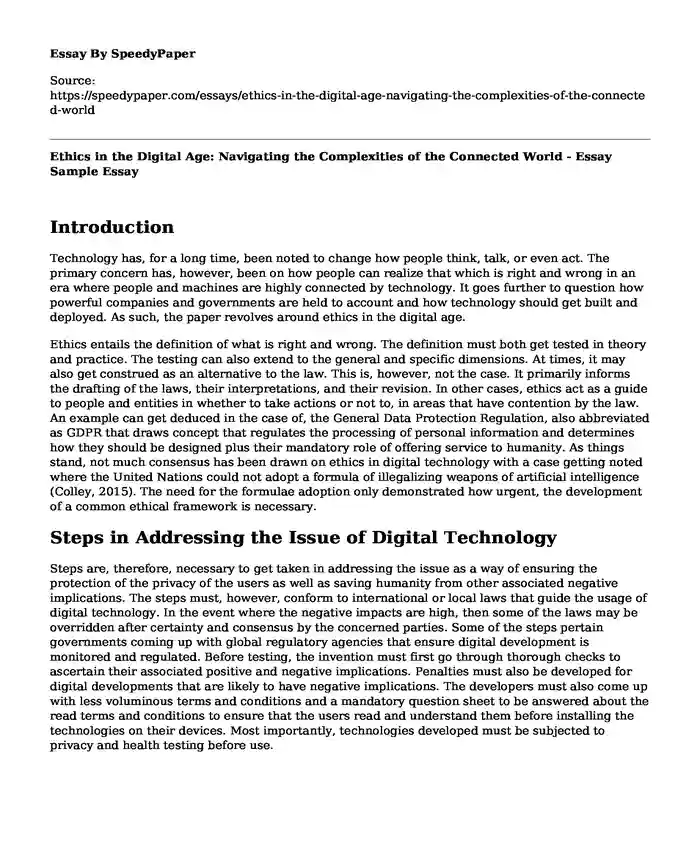
| Type of paper: | Essay |
| Categories: | Technology Ethics |
| Pages: | 3 |
| Wordcount: | 640 words |
Introduction
Technology has, for a long time, been noted to change how people think, talk, or even act. The primary concern has, however, been on how people can realize that which is right and wrong in an era where people and machines are highly connected by technology. It goes further to question how powerful companies and governments are held to account and how technology should get built and deployed. As such, the paper revolves around ethics in the digital age.
Ethics entails the definition of what is right and wrong. The definition must both get tested in theory and practice. The testing can also extend to the general and specific dimensions. At times, it may also get construed as an alternative to the law. This is, however, not the case. It primarily informs the drafting of the laws, their interpretations, and their revision. In other cases, ethics act as a guide to people and entities in whether to take actions or not to, in areas that have contention by the law. An example can get deduced in the case of, the General Data Protection Regulation, also abbreviated as GDPR that draws concept that regulates the processing of personal information and determines how they should be designed plus their mandatory role of offering service to humanity. As things stand, not much consensus has been drawn on ethics in digital technology with a case getting noted where the United Nations could not adopt a formula of illegalizing weapons of artificial intelligence (Colley, 2015). The need for the formulae adoption only demonstrated how urgent, the development of a common ethical framework is necessary.
Steps in Addressing the Issue of Digital Technology
Steps are, therefore, necessary to get taken in addressing the issue as a way of ensuring the protection of the privacy of the users as well as saving humanity from other associated negative implications. The steps must, however, conform to international or local laws that guide the usage of digital technology. In the event where the negative impacts are high, then some of the laws may be overridden after certainty and consensus by the concerned parties. Some of the steps pertain governments coming up with global regulatory agencies that ensure digital development is monitored and regulated. Before testing, the invention must first go through thorough checks to ascertain their associated positive and negative implications. Penalties must also be developed for digital developments that are likely to have negative implications. The developers must also come up with less voluminous terms and conditions and a mandatory question sheet to be answered about the read terms and conditions to ensure that the users read and understand them before installing the technologies on their devices. Most importantly, technologies developed must be subjected to privacy and health testing before use.
The Ethical Framework of Deontology
Notably, the ethical framework of deontology supports the steps. Deontology is concerned with the determination of whether an action is right or wrong based on the established rules (Spahn, 2020). As such, it directly relates to the suggested step as they are tied to either the provided international or the local laws that guide digital technology.
Conclusion
In summary, the debate about ethics in digital technology remains urgent, even with the steps that have been taken both locally and globally. More stringent measures need to be taken to ensure the protection of personal data and guard against other associated negative implications. Most, importantly, the steps discussed are grounded upon the ethical framework of deontology and as such, fit in addressing the issue.
ReferencesColley, S. (2015). Ethics and digital heritage. The ethics of cultural heritage (pp. 13-32). Springer, New York, NY. http://www.academia.edu/download/62300892/Colley2015EthicsDHIandSEd20200307-19656-1n9fka0.pdf
Spahn, A. (2020). Digital Objects, Digital Subjects and Digital Societies: Deontology in the Age of Digitalization. Information, 11(4), 228. https://www.mdpi.com/2078-2489/11/4/228/pdf
Cite this page
Ethics in the Digital Age: Navigating the Complexities of the Connected World - Essay Sample. (2023, Oct 13). Retrieved from https://speedypaper.com/essays/ethics-in-the-digital-age-navigating-the-complexities-of-the-connected-world
Request Removal
If you are the original author of this essay and no longer wish to have it published on the SpeedyPaper website, please click below to request its removal:
- Free Essay Sample on Risks of Computing Systems
- Essay Sample on the Impact of Mobile and Cloud Technology on Business
- Management Essay Example: New Products and CRM Software
- American Indian Mascot Essay Sample
- Essay Sample on Hacking Theory
- Free Essay on Ethical and Legal Implications, Strategies to Address Disclosure
- IRAN in Cyber Attacks - Essay Sample
Popular categories




